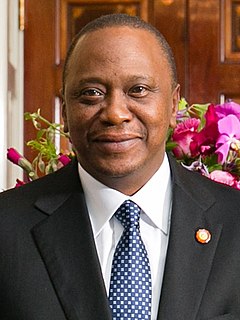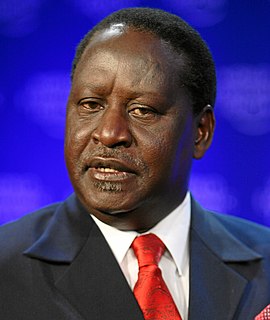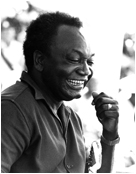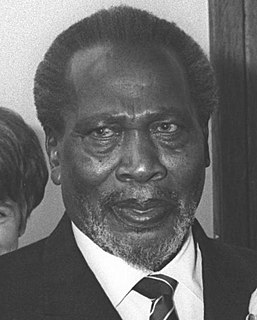
The politics of Kenya take place in a framework of a presidential representative democratic republic, whereby the President of Kenya is both head of state and head of government, and of a multi-party system in accordance with a new constitution passed in 2010.

The Kenya African National Union (KANU) is a Kenyan political party that ruled for nearly 40 years after Kenya's independence from British colonial rule in 1963 until its electoral loss in 2002. It was known as Kenya African Union (KAU) from 1944 to 1952.KAU was banned by the colonial government from 1952 to 1960.It was re-established by James Gichuru in 1960 and renamed to KANU on 14 May 1960 after a merger with Tom Mboya's Kenya Independence Movement.

Uhuru Muigai Kenyatta is a Kenyan politician and businessman who is the fourth and current President of the Republic of Kenya. He served as the Member of Parliament (MP) for Gatundu South from 2002 to 2013. Currently the party leader and a member of the Jubilee Party of Kenya, he was previously involved with The National Alliance and before that the Kenya African National Union.

Elections in Kenya take place within the framework of a multi-party democracy and a presidential system. The President, Senate and National Assembly are directly elected by voters, with elections organised by the Independent Electoral and Boundaries Commission (IEBC).

Raila Amolo Odinga is a Kenyan politician who served as Prime Minister of Kenya from 2008 to 2013, and has served as Leader of the Opposition since 2013. He was Member of Parliament (MP) for Langata from 1992 to 2013. He served in the Cabinet of Kenya as Minister of Energy from 2001 to 2002, and as Minister of Roads, Public Works and Housing from 2003 to 2005. Odinga was appointed High Representative for Infrastructure Development at the African Union Commission in 2018.

General elections were held in Kenya on 27 December 2002. They saw the end of the long-standing dominance of the Kenya African National Union, which had governed the country since independence in 1963, including 23 years as the only legal party. Mwai Kibaki of the National Rainbow Coalition was elected president, while the National Rainbow Coalition won a majority in the National Assembly.

General elections were held in Kenya on 27 December 2007, electing the President, National Assembly and local councils.

The Government of the Republic of Kenya (GoK) is the national government of the republic of Kenya which is composed of 47 Counties, each county with its own semi-autonomous governments. The national government is composed of three arms: the legislature, the executive and the judiciary. Each arm is independent of the other and their individual roles are set by the Constitution of Kenya. The full name of the country is the "Republic of Kenya". Its official Swahili name is 'Jamhuri ya Kenya'. Other terms such as GoK, GK and Serikali are popularly used to refer to the Kenyan government.

General elections were held in Kenya on 21 March 1988. At the time, the county was a one-party state with the Kenya African National Union as the sole legal party. The size of the National Assembly was expanded from 158 to 188 seats prior to the elections. Although the post of President of Kenya was due to be elected at the same time as the National Assembly, Daniel arap Moi was the sole candidate and was automatically elected without a vote being held. Following the elections, a further 12 members were appointed by President Moi.

General elections were held in Zambia on 12 December 1978. At the time, the country was a one-party state with the United National Independence Party (UNIP) as the sole legal party. UNIP leader Kenneth Kaunda was automatically elected to a fourth five-year term as President, with 80.7% of voters voting to confirm him in office. UNIP also won all 125 seats in the National Assembly. Voter turnout was around 65% in the parliamentary election, but 66.7% in the presidential election.

General elections were held in Kenya on 14 October 1974. At the time, the country was a de facto one-party state with the Kenya African National Union being the sole party to participate in the election. 740 KANU candidates stood for the 158 National Assembly seats, with 88 incumbents defeated. Voter turnout was 56.5%. Although the post of President of Kenya was due to be elected at the same time as the National Assembly, Jomo Kenyatta was the sole candidate and was automatically elected without a vote being held. Following the election, a further 12 members were appointed by President Kenyatta.

General elections were held in Kenya on 8 November 1979. At the time, the country was a de facto one-party state with the Kenya African National Union being the sole party to participate in the election. A total of 742 KANU candidates stood for the 158 National Assembly seats, with more than half of the incumbents defeated. Voter turnout was 67.3. Although the post of President of Kenya was due to be elected at the same time as the National Assembly, Daniel arap Moi was the sole candidate and was automatically elected without a vote being held. Following the elections, a further 12 members were appointed by President Moi.

General elections were held in Kenya on 26 September 1983. At the time, the country was a one-party state with the Kenya African National Union having been made the sole party the previous year. More than 750 KANU candidates stood for the 158 National Assembly seats, with around 40% of incumbents defeated. Voter turnout was 45.9%. Although the post of President of Kenya was due to be elected at the same time as the National Assembly, Daniel arap Moi was the sole candidate and was automatically elected without a vote being held. Following the elections, a further 12 members were appointed by President Moi.

Ronald Gideon Ngala (1923–1972) was a Kenyan politician who was the leader of the Kenya African Democratic Union political party from its creation in 1960 until its dissolution in 1964.
Joseph Martin Shikuku was a Kenyan politician.

The National Alliance (TNA) was a political party in Kenya. It attained its current identity when it was taken over by Uhuru Kenyatta and rebranded as the vehicle for his 2012 presidential campaign.

General elections were held in Kenya on 8 August 2017 to elect the President, members of Parliament and devolved governments. The reported results indicated that incumbent President Uhuru Kenyatta was re-elected with 54% of the vote. His main opponent, Raila Odinga, refused to accept the results and contested them in the Supreme Court.

The presidency of Jomo Kenyatta began in December 12, 1964, when Jomo Kenyatta was named as the 1st President of Kenya, and ended on August 22, 1978 upon his death. Jomo Kenyatta, a KANU member, took office following the formation of the republic of Kenya after independence following his efforts during the fight for Independence. Four years later, in the 1969 elections, he was the sole candidate and was elected unopposed for a second term in office. In 1974, he was re-elected for a third term. Although the post of President of Kenya was due to be elected at the same time as the National Assembly, Jomo Kenyatta was the sole candidate and was automatically elected without a vote being held. He died in August 22, 1978 while still in office and was succeeded by Daniel arap Moi.











